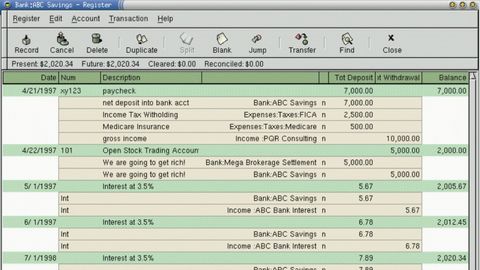
- #Where does gnucash save files how to#
- #Where does gnucash save files install#
- #Where does gnucash save files software#
- #Where does gnucash save files windows#

Print >sys.stderr, "Syntax %s src target" % (sys.Users who have registered businesses can buy products from merchants on the platform that meet their needs. Target_uri = ("xml://%s" % os.path.abspath(target_uri) if "://" not in target_uri else target_uri) Src_uri = ("xml://%s" % os.path.abspath(src_uri) if "://" not in src_uri else src_uri) New_session = gnucash.Session(target_uri, is_new=True) """Converts gnucash databases at the given uris from src to target"""

gnucashconvert filename.gnucash sqlite3:////home/username/export.sqlite): #!/usr/bin/env pythonĭef convert_gnucash(src_uri, target_uri): If you still want to use the XML files, you can use the following script to convert from XML to a database, and then write your reports on that (e.g. Print(df.loc = "Asset",Īs Chop Suey said, GnuCash 2.4 has its own database format. # print for account "Asset" some information on the splits # extract all split information to a pandas DataFrame Recent versions also allows to extract the split information directly to pandas DataFrames for easy plotting/analysis with from piecash import open_book Or to iterate over all the splits in the "Asset" account: # open the bookĪsset = mybook.accounts(fullname="Asset") With open_book("some_book.gnucash", open_if_lock=True) as mybook: With it you can easily access all the information contained in a book.įor instance, to iterate over all accounts in the book: from piecash import open_book I published piecash, a python interface to SQL saved GnuCash books that uses SQLAlchemy as basis ( ). You guys might have better suggestions in addition to those mentioned. Some workaround, like exporting to a certain file format for which there is a more mature Python library that can read it.
#Where does gnucash save files install#
sudo yum install gnucash GNUCash includes a New accounts wizard that helps users pick what they need.
#Where does gnucash save files software#
You can install it using Gnome Software or through the command line. It is available in Fedora’s repositories. More recently updated documentation aside from this one from the GnuCash wiki Luckily, there is a great open source tool available for all your budgeting needs GNUCash.As far as I know about GnuCash and Python, I think someone probably knows solutions of the following types: I hope someone can point me to a good start on this. My main objective is to read (no plans to write yet) my GnuCash files so that I can create my own visual dynamic reports using matplotlib and wxpython.
#Where does gnucash save files windows#
Though I can operate the Linux command line, I am running GnuCash on Windows XP. The instructions are tailored for the Linux environment, and a rather old GnuCash version (2.0.x). I have read about this python-gnucash which provides Python bindings to the GnuCash library, but it takes a lot of work at the moment (e.g.
#Where does gnucash save files how to#
I'm looking for information on how to read GnuCash files using python.


 0 kommentar(er)
0 kommentar(er)
